- The English version of Chichi to Kuraseba (The Face of Jizo) , was performed in the United Kingdom from Oct. 23 to Nov. 10. And this summer (2007) it has been translated into Chinese as well. This play tells the story of a daughter who lives with feelings of guilt at being the only one in her family to survive the Atomic Holocaust of Hiroshima and is unable to let herself love as a result. And, to encourage her to go on with her life and love, her father comes back from the dead as a ghost. In Japanese, the entire play is done in the native Hiroshima dialect. First of all, I would like to ask you what thoughts you have about the English-language performance in the UK this time and if there is any particular message you want to convey.
-
Chichi to Kuraseba
is a play in which the atomic bombing of Hiroshima is the central theme, and I think there is great significance in the fact that it has now been translated into the languages of countries that have nuclear weapons in their defense arsenals. There are some countries with nuclear weapons where the performance of such a play would be difficult, and so I feel that all the translations are a significant step forward.
As of the present, Japan is the only country in the world that has been the victim of an atomic bombing. Said in another way, we are the only country that has experienced war as it may be fought in the future [with nuclear weapons]. However, there is no guarantee that there will not be more countries subjected to nuclear Holocaust in the future. Today, there is a big potential nuclear disaster hanging over the heads of everyone on Earth, and it is an unfortunate fact that people throughout the world live with the knowledge that someday they may be the victims of a nuclear attack. My intent is not to make a strong appeal from the standpoint of a victim but to ask that we all think together about what should be done with this nuclear threat that hangs over all of our heads today.
Nuclear weapons are different from conventional weapons. With a conventional bomb, the threat is usually over once you survive the initial blast. That is not the case with nuclear weapons. You never know if you are going to suffer from its effects days, weeks, months or even years later. The negative effects [of radiation] can even be passed on to your offspring. Nuclear weapons are the worst weapons humankind has ever created. You could say that it is a weapon that embodies all of the worst of human malice . The very existence of nuclear weapons has a strong negative effect on the human psyche and the human spirit. I want people to know that and I want us to think together about what kind of environment we live in and what kind of world we want to create for the future.
Also, overseas readings and performances of Chichi to Kuraseba (The Face of Jizo) have been made possible in many cases through the efforts of Japanese living in those overseas countries. It is perhaps because people who have left Japan and now live overseas are more aware of the uniqueness of Japan as a country that has suffered an atomic bombing and as a country that has a non-aggression clause in its Constitution (Article 9) (*) that forbids the Japanese nation from using violent means to resolve conflicts.
(*) The Constitution of Japan
CHAPTER II
RENUNCIATION OF WAR
Article 9. Aspiring sincerely to an international peace based on justice and order, the Japanese people forever renounce war as a sovereign right of the nation and the threat or use of force as means of settling international disputes.
In order to accomplish the aim of the preceding paragraph, land, sea, and air forces, as well as other war potential, will never be maintained. The right of belligerency of the state will not be recognized.- It doesn’t seem to me that most Japanese are aware of the importance of the fact Japan can make vital statements to the world based on the fact that it is the only country to have suffered an atomic bombing and the fact as a country we have adopted the Article 9 non-aggression clause in our constitution.
- Taking Article 9 as an example, we can say that the Antarctic Treaty (1959) that designated only peaceful use of the Antarctic continent and prohibited and military activities or territorial sovereignty claims was made possible because of the spirit of Article 9. It was a time when various countries were worried about their interests in Antarctica and afraid that open conflict might erupt as a result of various countries attempts to establish bases and sovereignty claims. For the first time after World War II, Japan took an active international role in proposing and negotiating a treaty that declared Antarctica as joint property of the entire world that can not be used by any nation for military purposes and that any nation is free to conduct scientific research there. This Antarctic Treaty then became the model for the Treaty for the Prohibition of Nuclear Weapons in Latin America (Treaty of Tlatelolco) (1967), the South Pacific Nuclear Free Zone Treaty (Treaty of Rarotonga) (1985) and other nuclear-weapon-free treaties that have now made most of the Southern Hemisphere free of nuclear weapons. Also, outer space and the ocean bottoms have been made nuclear-free zones by international treaties.
In this way, Article 9 is one of the things that Japan can be proud of in today’s world. In the world today there are people with fundamentalist attitudes who try to force their beliefs and values on other nations. But, human beings are in fact quite inconsistent spirits, and where it is individuals or nations, we all have our good points and our bad points. So, what we have to do is to recognize each other’s good points. I believe that it is a miracle that the six billion people of humanity live on this Earth, and I want to see people value the fact that they have been born and are alive today more than most people seem to.- Another underlying theme in Chichi to Kuraseba (The Face of Jizo) is “responsibility for the War.” This is an important theme for you that you have dealt with extensively in your Trilogy of Plays on the Tokyo Trials ( Tokyo Saiban Sanbusaku ) and your Trilogy on the Lives of the Common People of Japan during the Showa Period (1926-89) ( Showa Shomin Sanbusaku ).
- In the end it is we the people who make war. Of course, the [Showa] Emperor [Hirohito] was involved in some to the strategy behind World War II, so I believe that he did have some responsibility for the War. But more responsible were the people who used the Emperor. And I also believe that the people who went along with the war policies unquestioningly and the people who believed literally that the Emperor was a descendant of the gods—in other words the common people of the country—also share a big part of the responsibility. We need a social environment where each individual citizen thinks and formulates his or her own opinions about the issues of the times and those opinions are represented in the government by the elected officials they choose. That sounds like common sense, but I believe that even today that is not the case in Japan.
Young people today use the expression “KY” meaning people who can’t read ( Yommenai ) the atmosphere ( Kuki ) of a situation. Japanese are always trying to read the atmosphere or mood of a situation and act in accordance with it. And a person who can’t do that is dismissed as a “KY.” In other words, the Japanese are not moved by people but by the “atmosphere” of things. Since individuals are not independent (autonomous, self-reliant) [in Japan] they blindly move like a herd of sheep, changing their opinions or attitude whenever the atmosphere changes. You often see someone who was joining the festivities until just a minute ago suddenly turn cool and critical.
During the War there were some people who were opposed to it. But the atmosphere of the times didn’t allow them to be recognized. Because we move according to the atmosphere of the times like this, it becomes the atmosphere itself that is the leading force and, as a result, no one takes responsibility. The atmosphere of things at any given time is not human, so it can’t take responsibility.- What can the role of theater be in such a world?
- I believe that theater can be a tremendously powerful force. Since I also write novels, I know that novels are cumbersome things. In theater, you have a man and a woman on the stage and when they smile at each other, that is all that is needed to communicate the meaning. In a novel, however, that same scene has to be expressed in words with carefully detailed portrayal. In the case of theater, however, you have the actors’ bodies and gestures, facial expressions and voices to read the meaning from instantaneously. And, because of this physical use of the human body, theater also has the power to transcend national borders easily and become a borderless form of communication.
I often use King Lear as an example. You might for example have an elderly lady in the audience, and sitting next to her is a young entrepreneur, and behind them sits a scholar. The lady had a pair of tickets forced on her by her daughter, who had originally been planning to see King Lear with her husband but suddenly changed her mind when they were able to get tickets to a football match. This daughter had always been a selfish, self-centered person. She made her mother—the elderly lady—take the tickets, saying that she could refund one of them and use the money to have a nice eel dinner or something after the show. The lady is not interested in the play whatsoever, and she is fed up with her daughter, but she also has nothing better to do. So here she is at the play, although she is not enjoying being here at all because she is in a complaining mood.
As for the young entrepreneur, he is in fact in debt and being chased by the loan collectors. He has no place left to run, and when he ducks into the theater he happens to be passing, he is told at the ticket office that someone just returned a ticket. He buys the ticket and finds his way to the seat. He is a man with no dreams or hopes left and he is tired out.
Behind them sits the scholar, who happens to be a theater critic. He is from a rich family and has never known any real hardships in his life up until now. He was able to study abroad as if it were a natural privilege, and his only real concern is that he can’t get a position as a college professor. When he was younger, there had been an offer for him to marry a professor’s daughter, but he ended up marrying a prettier girl at graduate school. He now regrets that decision. He thinks he knows this play thoroughly and sits there in the audience not expecting much from the performance.
However, once the curtain rises and the play begins, it turns out to be a wonderful performance of King Lear . Part way through the play, the elderly lady has found herself in the protagonist King Lear . Like the King, she feels that she tried hard to raise her daughter with care and loving, but that love was lost on her daughter and now she is treated as nothing more than a bother by her. She feels King Lear’s anguish so tangibly that although she is sitting in the audience her heart is up there on the stage. In her mind she is cries out, “That old man’s anguish is the same as my own!”
Meanwhile, the other people in the audience are for some reason feeling the same thing that the lady is feeling. They are all feeling that sense of identification with King Lear. Moved by the old lady’s reaction, the scholar suddenly begins to think about his elderly parents. He has seen King Lear many times before, but he has never felt this association. He begins to contemplate the hardships his parents have been through. Until now he had thought that going to a good school and being able to study abroad naturally and continue his studies uninterrupted were all the results of his own efforts. But now he realizes that perhaps it wasn’t so. He decides that he will give his parents a call when he leaves the theater. At the same time, a change is taking place in the young entrepreneur sitting in front of him. Although he had thought himself too worn out and distressed to think about business or anything anymore, he now finds himself thinking that he is alive and here today because of his parents’ care. He had caring parents and many people who helped him in some way or another. Perhaps thing of himself as alone and independent had been little more than self-delusion. He, too, is now leaning forward in his seat, trying to catch every gesture and every word that comes from the actors.
By this point the stage and audience are one and the entire theater is enveloped in a special atmosphere. It is as if everyone in the theater is involved in the play together, with all of their combined pasts, their knowledge and their intellects joined together. A good play may be a sort of ritual that has the power to make you forget yourself for a moment, to become innocent and receptive and to be reborn.
Then the curtain finally falls. The same audience will never be together to see a play in this way again. And, naturally, the performance of this same play will never be exactly the same. This is the end of an event that will never take place in this way again in the universe. Realizing this, it is hard to stand up and leave. When a play has been performed well the audience is slow to get up from their seats. There is a softness to the elderly lady’s face that wasn’t there before. The young entrepreneur has decided that he is not going to try to run away anymore. The scholar stops in the lobby to make a cheerful phone call to his parents. These are the kinds of miracles a play can make happen. Surely no amount of preaching or lecturing could ever have moved these people like this. It would have done no good just to tell the elderly lady that a daughter is a daughter no matter what kind of personality she might have, or to tell the young entrepreneur that if he just keeps hope and works hard there will be rewarding days too. Such lecturing is useless, but one good play can have the power to move the very soul of a person and change them.
Because I work with an art with such power to move people, I feel a responsibility to give plays that I believe are truly good. People are constantly the prisoners of time, right up until the moment we die. The one time when we can be free from the chains of time is when we lose ourselves in theater. That is when we can stand boldly and look time in the face. That is the kind of special place I believe the theater is.- Your plays contain a rich assortment of laughter, song, play on words, plays within a play and even surprise endings. Is there a particular philosophy behind this kind of richly diverse theater style?
- If the type of time that flows in the theater is the same as that of daily life, there is no reason to come to the theater in the first place. If it is biographical play you have to compress, for example, the 37 years of Kenji Miyazawa’s life or the 24 years of Ichiyo Higuchi into a couple of hours. In other words, the job of the playwright should be to create some sort of temporal theory of how to capture time and develop on it. A surprise ending is a type of conversion of time and comedy can be likened to a process of filling in the gaps in time. You can employ interesting ways to abbreviate time, or you can draw out time like Shogo Ota does in his wordless theater. I want to employ these methods to create time where we can forget our selves.
To do this I must work with great care. When it comes to the choice of words, I usually choose yamato kotoba , or native Japanese words. In Japanese, you can usually choose among three types of words. For example in the case of saying “washing” we can choose the native Japanese word arau , the Chinese character derivative sentaku suru or the English derived kuriiningu (cleaning) suru . You have to choose one of these. If you choose the Chinese derived sentaku suru the audience will pause to think for a moment, and it is a moment when they are drawn back into reality. Consider the three words of rule, Japanese kimari , the Chinese derived kisoku and the English derived ruru (rule) . In this case kisoku is more difficult to understand than kimari . The playwright shows his/her skill by choosing the word that will make the audience understand instantaneously.
Also, I question the use of too many English derived katakana words. Katakana English appears new but is often lacking in content. When I have time while riding the trains, I often make a practice of translating the English derived words in the advertisements in the train back into Japanese. If you try it you will see. If you use these words your Japanese will become poorer, and people who use them in excess will soon be tired out by the process. I believe that speaking and thinking in Japanese words that we feel most intimately is the best practice. As a playwright, what I want to give the audience is a “joy of living with the Japanese language” of the kind that makes people feel glad they were able to hear things expressed in Japanese and glad that they speak the Japanese language. I would go further to say that I want the audience to share with me the “Joy of living with language.”- In terms of language, Chichi to Kuraseba is written completely in the Hiroshima dialect. Such a specific use of a local dialect of Japanese must have made it very difficult to translate.
- If the Japanese is well written and certain in meaning, it can naturally be translated into other languages, but it is not possible to communicate the specific beauties and interest of the Hiroshima dialect. People don’t use standardized Japanese for visceral expressions of their deepest, most painful emotions or anxieties. For Chichi to Kuraseba I went to the library and studied the Hiroshima dialect as it is spoken in the Naka-ku district of Hiroshima, and I sat in coffee shops and listened for hours to how it is actually spoken as I was writing Chichi to Kuraseba . The fact that this dialect can’t be translated doesn’t mean that foreign audiences can’t understand this play, however. Just as when we read Chekhov or Dostoevsky in Japanese translation, the flavor may be somewhat different from the original, but we are still deeply moved by its stories and understand much from them. Also, in the case of theater you have the actors. Even if there are things that can’t be translated, I believe that much will be communicated to the audience through the performance of the actors.
- This August you introduced your newest work, titled Romance . This is a biographical work done in a Vaudeville style about Anton Chekhov, who once said that he wanted to try writing a Vaudeville play once in his career.
- I rediscovered theater as a “total” art form. Until now I had thought of theater as a total art form in the sense that it brought together on the same stage the capabilities of the musician (composer), the stage artist, the lighting artist, the director and the actors. But seeing this play, I got the feeling that theater itself—in other words the stage itself—is painting and music and sculpture and poetry. Theater is a form of expression that contains all these elements. It makes me appreciate anew what an amazing art form I am involved in. In today’s world where everything is moving in the direction of rationalization, efficiency and simplification, theater still makes audiences come to it, and even makes them pay in advance. No form of expression is as selfish as theater. Still, if we can supply the audience with good plays they forgive that selfishness and find joy in what they come to see. I felt this all clearer than ever with this latest play. In other words, with Romance this time I feel like I have finally come to the starting point of theater’s true potential. I guess that until now I have been in my period of training (laughs).
- That is being too humble (laughs). And, now that your period of training is over, what kind of plays will you be writing from now on?
- I wonder how much time I have left. I hope I have ten years. That should be enough (laughs).
Next I am writing about the swordsman Musashi Miyamoto. He is a subject I have wanted to tackle for some time. When we think of Musashi, our image of him is certainly colored strongly by the great work of Eiji Yoshikawa. But, I have an image that lies in a slightly different direction. I plan to concentrate not on his strength or weaknesses as a swordsman but on the ideals of his “way of the sword” as it existed in the peaceful life of Musashi’s later years of retirement from the world.
I believe that we are in an age when we are searching for new balance in all facets of life. If we don’t find a new way of living soon, and one that is on a different dimension from the way we have lived until now, the Earth would only be able to support a much smaller number of people. When we think in terms of the entire Earth the scale is so vast that things get vague, but it is really the same as thinking about the Japanese population and the Land area of Japan. For the Earth to survive we have to transcend conflicts in interest and we definitely have to find new values to live by. So, it may be that world environment issues will be the theme of my upcoming Musashi’s biographical play (laughs).
I believe that the role of the arts is to give people hints about better ways to live, if not to the whole of humankind at least to all who support the arts. You can think in terms of suggestions for ways to change one’s life or new ways of thinking. Works of art that don’t provide this are, in the end, works that the artists are creating for themselves only. If we don’t have something that we want to bring to people, if we don’t want to live life with people, if our work doesn’t have that direction then they won’t pay the cost of admission to the theater, I believe. At the core of my works I always want to have ideas that will help people find the way to live on the next Earth or ways of thinking that will make that life easier to live.
Hisashi Inoue
Playwright Hisashi Inoue puts a prayer for peace in his play Chichi to Kuraseba (The Face of Jizo), now translated into eight languages
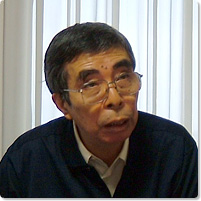
Hisashi Inoue
The writer and playwright Hisashi Inoue was born in Kawanishi-machi, Higashiokitama-gun, Yamagata prefecture in 1934. He graduated from the French course of the Foreign Language Dept. of Sophia University. During his university years he became the Cultural Affairs and Promotions chief of the France-za burlesque and strip theater in the Asakusa district of Tokyo and began writing scripts for the theater’s performances. From 1964 he became one of the scriptwriters for the NHK national broadcasting company’s puppet theater program Hyokkori Hyotanjima . His works won the hearts of many people with their humor and satire based on an unfaltering sense of the contemporary. He made his debut in the theater world with the play Nihonjin no Heso (belly button of the Japanese) that he wrote for the theater company Theatre Echo in 1969. In 1972 he won the Naoki Prize for the novel Tegusari Shinju (Handcuffed Double Suicide), which dealt with the lives of popular writers in Japan’s Edo Period. That same year he won the Kishida Drama Award and the Selected New Artist Award for Dogen no Boken (the adventures of Dogen). He won the Kinokuniya Drama Award and the Yomiuri Literature Award (Drama Division) for his plays Shimijimi Nippon-Nogi Taisho and Kobayashi Issa . In 1984 he founded the Komatsu-za theater as a company to produce and perform his plays. For it he wrote a succession of plays including Zutsu Katakori Higuchi Ichiyo , Kirameku Seiza , Yami ni Saku Hana , Yuki ya Konkon , Ningen Gokaku , Mokuami Opera , Rensagai no Hitobito and Ani Otouto . Throughout his career, Inoue has been a prolific playwright, novelist and essayist. In 1987 he donated his vast collection of books to his hometown of Kawanishi-machi for the creation of a library named the “Writer’s Block Library. His play Chichi to Kuraseba has been translated into English, French, German, Russian, Italian and Chinese, and numerous others of his plays and novels such as Kesho (Makeup) , Yabuhara Kengyo and Bun to Fun have translated and performed to high acclaim overseas. Hisashi Inoue died on April 9, 2010.
Interviewer: Hirofumi Okano; interviewed: October 19, 2007
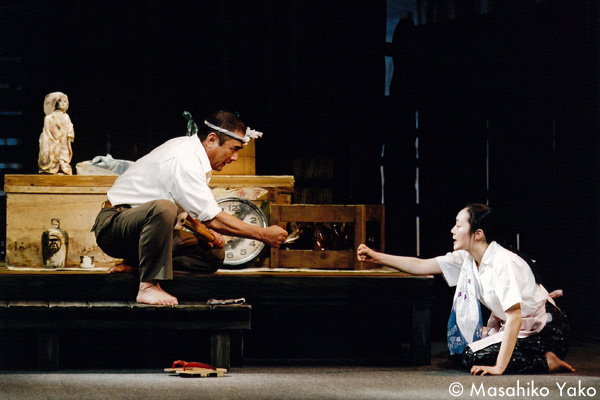
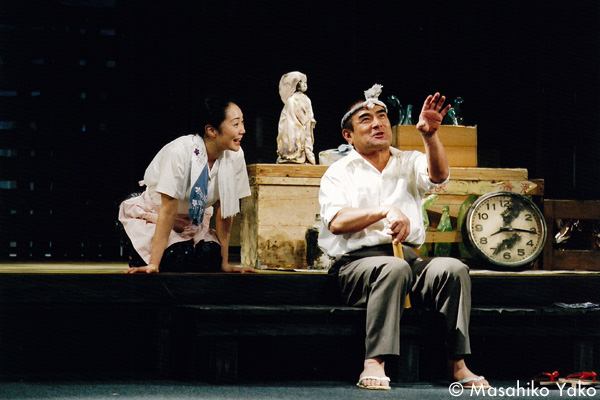
73th Komatsuza production Face of Jizo (Chichi to Kuraseba)
(July 27 – August 1, 2004 at Kinokuniya Southern Theatre)
Directed by Hitoshi Uyama
Photo: Masahiko Yako
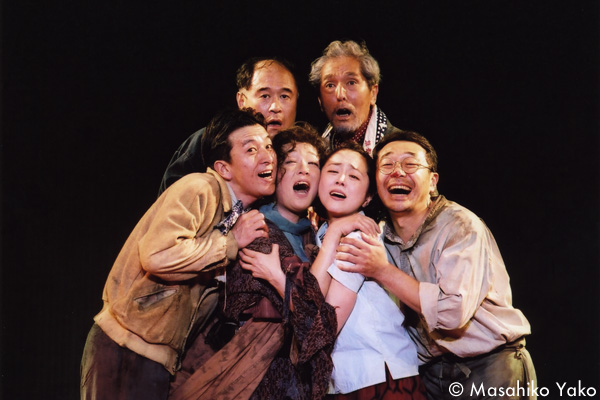
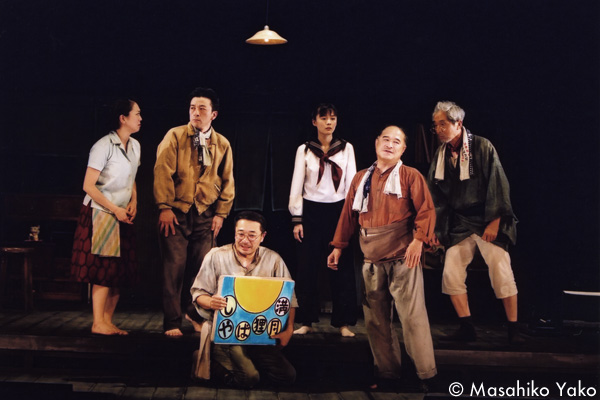
Yume no Sakeme
(A Clack in the Dream)
(May 8 – 31, 2001 at New National Theatre, Tokyo “The Pit”)
Directed by Tamiya Kuriyama
Photo: Masahiko Yako
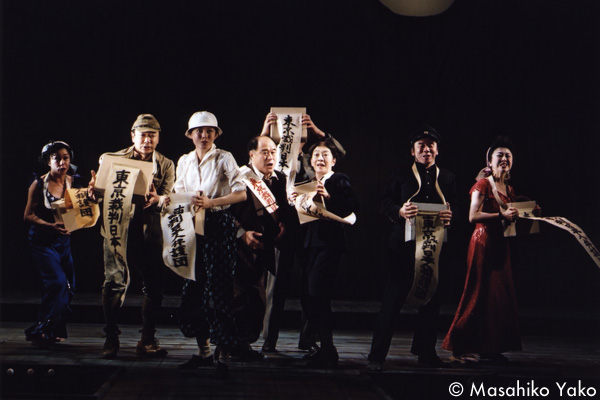
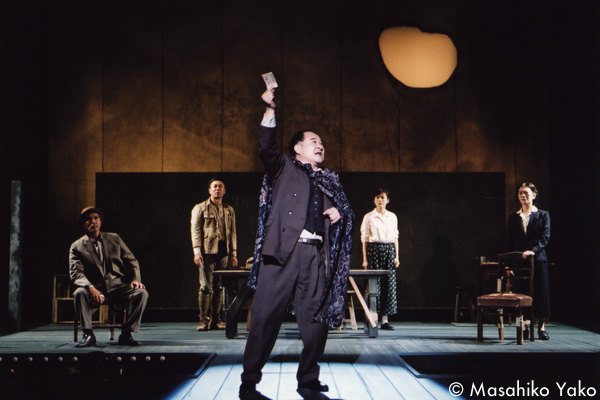
Yume no Namida
(Tears of the Dream)
(October 9 – November 3, 2003 at New National Theatre, Tokyo “The Pit”)
Directed by Tamiya Kuriyama
Photo: Masahiko Yako
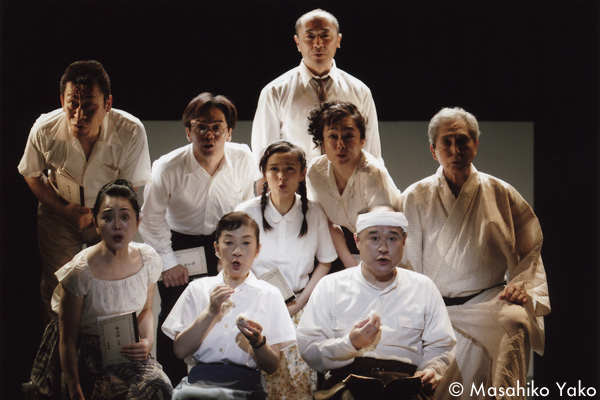
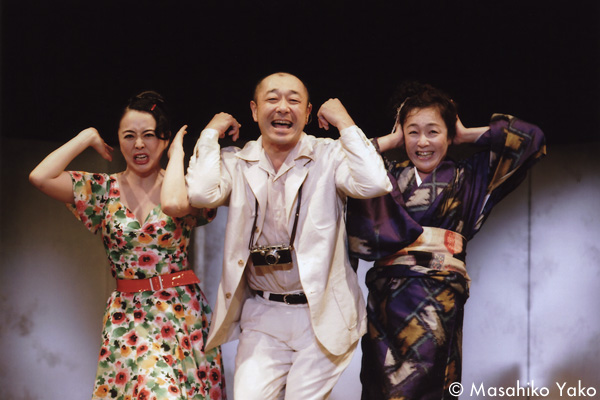
Yume no Kasabuta
(Scab of the Dream)
(June 28 – July 23, 2006 at New National Theatre, Tokyo “The Pit”)
Directed by Tamiya Kuriyama
Photo: Masahiko Yako
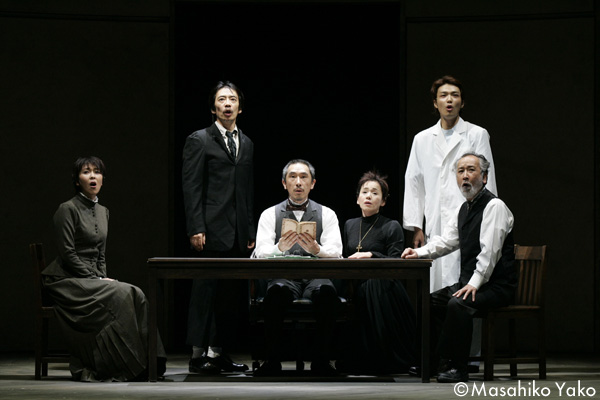
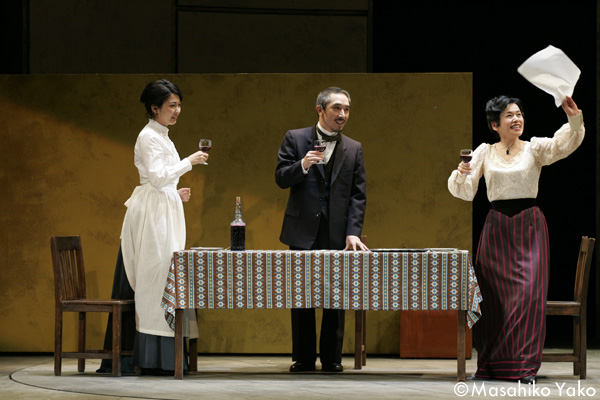
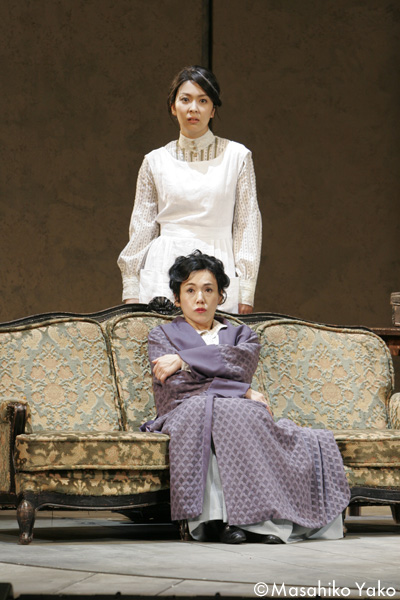
Komatsuza and SIS Company Joint Production
Romance
(August 3 – September 30, 2007 at Setagaya Public Theatre)
Directed by Tamiya Kuriyama
Photo: Masahiko Yako
Related Tags

